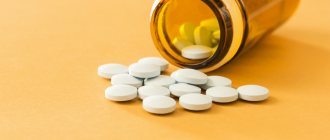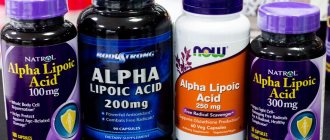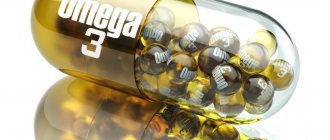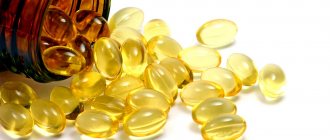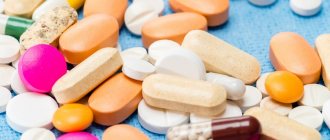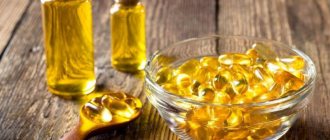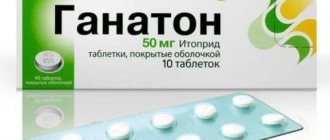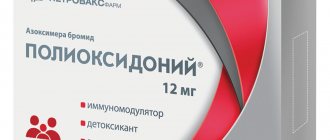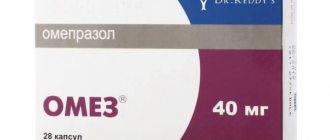Ingredients: per capsule
Active ingredients: alpha-glutamyl-tryptophan sodium (Timogen® sodium) 0.5 mg, ascorbic acid 50 mg, bendazole hydrochloride (Dibazol) 20 mg; Excipients: Lactose monohydrate 97.8 mg, calcium stearate 1.7 mg;
Composition of the capsule shell:
Body: titanium dioxide 2%, gelatin up to 100%. Cap: titanium dioxide 2%, sunset yellow dye 0.2190%, azorubine dye 0.0328, gelatin up to 100%.
Description:
Hard gelatin capsules No. 3 with a white body and an orange cap. The contents of the capsules are odorless, white to yellow powder.
Pharmacotherapeutic group:
Immunostimulating agent.
ATX code: L03AX
Pharmachologic effect:
Pharmacodynamics:
The drug is a means of etiotropic and immunostimulating therapy, has an indirect antiviral effect against influenza A and B pathogens, as well as other viruses that cause acute respiratory diseases.
In in vitro studies, the drug specifically suppresses (inhibits) the reproduction (replication) of the SARS-CoV-2 virus, which is the causative agent of the new coronavirus infection (COVID-19).
The degree of inhibition of the pathogen increases with increasing concentration of the drug (the linearity of the dose-effect relationship is shown). Reduces the severity of the main clinical symptoms of influenza and ARVI, and also shortens the duration of the disease and contributes to its uncomplicated course.
Increases the content of secretory immunoglobulin A (slgA) in the mucous membrane of the nasopharynx - the entrance gate of infection, increasing the local immunoresistance of the body to respiratory infections of a viral and bacterial nature.
With a preventive effect, the drug increases the potential metabolic activity of innate immune cells (neutrophil granulocytes and monocytes), which, in the event of infection, increases their ability to absorb and destroy bacterial and viral agents due to increased enzymatic (oxidative) activity, synthesis of cationic proteins and increased number of phagocytic cells. In this case, the initial state of metabolic activity of innate immune cells, in the absence of infectious agents, does not change, being within normal values.
Bendazole induces the body's production of endogenous interferon and has an immunomodulatory effect (normalizes the body's immune response to various infectious agents). Enzymes, the production of which is induced by interferon in the cells of various organs, inhibit viral replication.
Alpha-glutamyl-tryptophan (thymogen) is a synergist for the immunomodulatory effect of bendazole, normalizing the T-cell component of immunity.
Ascorbic acid activates the humoral component of the immune system, normalizes capillary permeability, thereby reducing inflammation, exhibits antioxidant properties, neutralizing oxygen radicals that accompany the inflammatory process, and increases the body's resistance to infection.
Pharmacokinetics:
When taken orally, the drug is completely absorbed from the gastrointestinal tract. The bioavailability of bendazole is about 80%, alpha-glutamyl tryptophan is no more than 15% and ascorbic acid is 90%. Metabolites of ascorbic acid and bendazole are excreted in the urine. Alpha-glutamyl-tryptophan, under the influence of peptidases, is broken down into L-glutamic acid and L-tryptophan, which are used by the body in peptide synthesis.
Indications for use:
Prevention and complex therapy of influenza and acute respiratory viral infections in adults and children over 6 years of age.
Contraindications:
Hypersensitivity to the components of the drug, pregnancy, children under 6 years of age.
Carefully:
during breastfeeding, use is possible if the expected benefit to the mother outweighs the potential risk to the child.
Directions for use and dosage:
Inside, 30 minutes before meals. Single dose for adults and children over 6 years of age – 1 capsule. For treatment: one capsule 3 times a day for 4 days. For prevention: - in direct contact with a patient with influenza and other acute respiratory viral infections, one capsule 3 times a day for 4 days. — during the period of epidemic rise in the incidence of influenza and other acute respiratory viral infections, one capsule 1 time per day for 12 days. Preventive courses, if necessary, are repeated after 3 weeks (until the epidemic situation normalizes).
Side effects:
Allergic reactions, short-term decrease in blood pressure.
Overdose:
Symptoms: short-term decrease in blood pressure in elderly patients with vegetative-vascular dystonia. Monitoring of kidney function, blood pressure and blood glucose concentrations is necessary.
Interaction with other drugs:
No interaction of alpha-glutamyl-tryptophan with drugs has been identified.
Bendazole prevents the increase in total peripheral vascular resistance caused by the use of non-selective beta-blockers. Strengthens the hypotensive (lowering blood pressure) effect of antihypertensive and diuretic drugs. Phentolamine enhances the hypotensive effect of bendazole.
Ascorbic acid increases the concentration in the blood of antibacterial drugs of the tetracycline series and benzylpenicillin. Improves the absorption of iron (Fe) preparations in the intestines. Reduces the effectiveness of heparin and indirect anticoagulants. Acetylsalicylic acid (ASA), oral contraceptives, fresh juices and alkaline drinks reduce its absorption and absorption. When used simultaneously with ASA, the urinary excretion of ascorbic acid increases and the excretion of ASA decreases. ASA reduces the absorption of ascorbic acid by approximately 30%. Ascorbic acid increases the risk of developing crystalluria when using drugs containing acetylsalicylic acid (ASA) and short-acting sulfonamides, slows down the excretion of acids by the kidneys, increases the excretion of drugs that have an alkaline reaction (including alkaloids), and reduces the concentration in the blood of oral contraceptives. When used simultaneously, it reduces the chronotropic effect of isoprenaline. Reduces the therapeutic effect of antipsychotic drugs (neuroleptics) - phenothiazine derivatives, tubular reabsorption of amphetamine and tricyclic antidepressants. Barbiturates and primidone increase the excretion of ascorbic acid in the urine.
Possible simultaneous use with antiviral drugs and symptomatic treatment of influenza and ARVI.
Consult your doctor if you are taking the medications listed in this section or other medications.
Special instructions:
The drug does not affect the ability to drive vehicles or engage in other potentially hazardous activities that require increased concentration and speed of psychomotor reactions.
Release form:
Capsules. 12 capsules each in a blister pack made of PVC/PCTFE/PVC film (polyvinyl chloride/polychlorotrifluoroethylene/polyvinyl chloride) or PVC/PVDC/PVC (polyvinyl chloride/polyvinylidene chloride/polyvinyl chloride) and printed varnished aluminum foil. One, or two, or four blister packs with instructions for use in a cardboard pack.
Storage conditions:
At a temperature not higher than 25 oC. Keep out of the reach of children.
Best before date:
3 years. Do not use after the expiration date stated on the packaging.
Vacation conditions:
Over the counter.
Legal entity in whose name the registration certificate was issued: Joint Stock Company Medical-Biological Research and Production Complex Cytomed, Russia. (Cytomed Oy). Production site address: Finland, 55300 Rauha, Laastitie 1 Cytomed Oy. Finland, 55300 Rauha, Laastitie 1. Name and address of the organization authorized by the holder (owner) of the registration certificate of a medicinal product for medical use to accept claims from the consumer: JSC MBNPC Cytomed, Russia. 194356, St. Petersburg, Orlovo-Denisovsky prospect, 14, building 1, tel., cytomed.ru.
Who should not use it
The drug is contraindicated if the patient has:
- thrombophlebitis;
- thrombophlebitis;
- personal intolerance;
- hypertonic disease;
- severe renal failure;
- bronchial asthma;
- cramps, decreased muscle tone;
- diabetes;
- pregnancy;
- ulcer of the stomach and duodenum.
Also, the drug should not be taken by children under one year of age. You can take this medicine while breastfeeding, but under medical supervision. The same applies to those taking anticoagulants.
Clinical Application
Multicenter clinical and epidemiological studies have shown that Cytovir-3 is an effective means of emergency nonspecific prevention of influenza and acute respiratory viral infections.
The use of cytovir-3 during an epidemic outbreak of respiratory diseases helps reduce the incidence rate by 3 times.[8]
If Cytovir-3 is used in combination with vaccination against influenza, then in this case the incidence rate is reduced by 5-7 times, and this reduction applies not only to influenza as such, but also to other acute respiratory viral infections.[9]
The use of the drug against the background of an already developed disease can reduce the duration of the disease by an average of 1.2 - 2.5 times and significantly reduce the risk of developing post-infectious complications. Thus, the incidence of acute bronchitis during the period of a viral disease is reduced by 7 times, and the risk of developing acute pneumonia by 13 times.[8]
Notes
- https://www.ndrugs.com/?s=cytovir-3
- State register of medicines (unspecified)
. grls.rosminzdrav.ru. Access date: December 7, 2012. Archived December 30, 2012. - Immunostimulating agent Cytovir-3
- Tsitovir-3 capsules
- Tsitovir-3 syrup for children
- Tsitovir - 3 powder for solution for children
- Smirnov V.S., Tsikarishvili G.V., Stepanov A.V. Preventive and therapeutic activity of cytovir-3 in experimental influenza infection // Bulletin of the Ural Medical Academic Science. 2011, No. 2/2, (35). pp. 66-67
- ↑ 123
Smirnov V. S. Modern means of prevention and treatment of influenza and ARVI. SPb: FARMIndex, 2010 ISBN 978-5-91753-015-4 - Shipitsyn K. S., Ogarkov P. I., Smirnov V. S. et al. Prevention of acute respiratory viral infections and pneumonia in an organized team // Epidemiology and infectious diseases. 2010. No. 1. P. 57-61
Literature
- Shipitsyn K. S., Ogarkov P. I., Smirnov V. S., Zhogolev S. D., Zhogolev K. D.: Prevention of acute respiratory viral infections and pneumonia in an organized team, “Epidemiology and Infectious Diseases”, 2010, No. 1, pp. 57-61
- Smirnov V.S.: Modern means of prevention and treatment of influenza and ARVI. St. Petersburg, FARMIndex, 2010, ISBN 978-5-91753-015-4
- Ramsh S. M.: History of the creation of the domestic drug dibazol, “Historical and Biological Research”, 2011, T. 3, No. 4, P. 36-59.
- Bulgakova V. A., Balabolkin I. I., Sentsova T. B.: Acute respiratory infections in frequently ill children, “Medical Council”, 2007, No. 3, pp. 16-22.
- Proceedings of the first congress of the Euro-Asian Society on Infectious Diseases, “Journal of Infectology”, 2010, T, 2, No. 4. P. 68.
- Denisova M.: Review of the market of immunomodulatory drugs, [1], 2005, No. 9, pp. 47-52.
- Osidak L. V., Drinevsky V. P., Erofeeva M. K., Eropkin M. Yu., Konovalova N. I., Smorolintseva E. A., Golovacheva E. G., Donlurey E. A., Baybus A. M., Voitsekhovskaya E.M., Tsybalova L.M.: Influenza as a problem of the 21st century, “Children's infections”, 2009, T. 8, No. 3, P. 3-9.
- Clinical pharmacology of thymogen / Ed. V. S. Smirnova. SPb.: FARMin-dex, 2004, P.54-71, ISBN 5-94403-015-1
- Barycheva L.Yu., Golubeva M.V., Germanova O.V.: Specific and nonspecific prevention of acute respiratory infections in children Vestnik of the North Caucasus", 2010, No. 1, P.64-76
Side effects
Usually the medicine is well tolerated by patients, but sometimes undesirable effects may occur:
- heartburn;
- nausea;
- stone formation in the kidneys and gallstones;
- Quincke's edema;
- hives;
- anaphylactic shock;
- disruption of the pancreas;
- cardiopalmus;
- low pressure;
- headache;
- insomnia;
- dizziness;
- thrombocytopenia;
- cough;
- feeling of heat;
- sweating
Sometimes there is a metabolic disorder. If the following phenomena are detected, you should stop taking the drug.
Analogues of the drug
Tsitovir-3 has many analogues:
- Alokin alpha;
- Arbidol;
- Anaferon;
- Timalin;
- Kagocel;
- Immunal;
- Echinacin Madaus;
- Glutoxim;
- Lavomax;
- Orvirem;
- Lynchy;
- Arbivir-health.
These drugs are different in composition, but identical in action. All of them are aimed at activating the immune system and fighting viruses. Their effectiveness is different, the price is also different. Immunal, for example, contains an extract of the herb Echinacea, this is a herbal preparation. And Kagocel is a chemical preparation containing the sodium salt of a copolymer.
Anaferon is an interferon derivative that activates the body’s own immunity. Arbidol has an antiviral effect. So you need to select the drug in accordance with the doctor’s recommendation and the degree of the disease.

